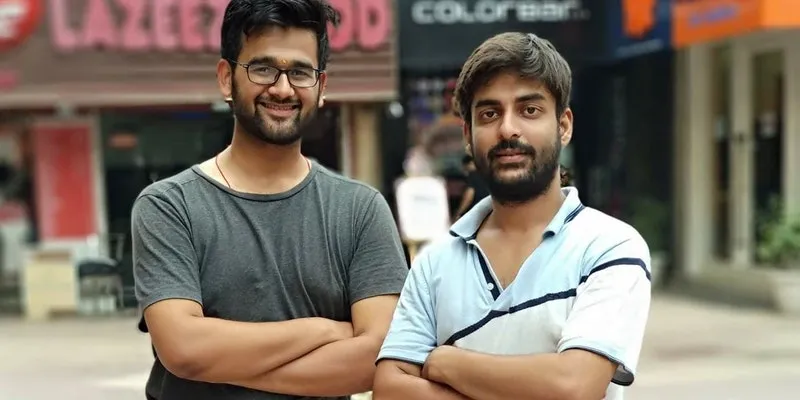Planning to eat healthily? Gurugram startup Falhari delivers fresh fruits, lassis at your doorstep
Gurugram-based Falhari is an online-subscription based startup focussed on serving fresh and healthy raw foods to consumers
It has been two weeks into 2020. While many of us would have made new year resolutions to eat healthier and follow a nutritional diet, very few of us would have actually been able to follow it diligently. Consumers are not always aware of the healthy options available to them, it is just simpler to get a burger down the street.
This led Gulshan Sharma and Rahul Shankar Bhardwaj to start in 2015. The Gurugram-based startup is a one-stop solution to fill up the whitespace in the nutrition profile of food with a variety of fresh, tasty, and nutritious uncooked food that your body deserves.
“All our products are based on continuous research about the nutrition profile of various ingredients and how they complement each other. Besides this, we take into account 20+ vitamins and minerals while coming up with a combination of fruits, nuts, seeds, and veggies, in addition to calories and protein,” says Gulshan.

Founders of Falhari - Rahul and Gulshan
How does it work
The platform works on a three-step process. It begins with creating a health profile for the consumer.
“We take into account the learnings from both ancient traditions and modern science to create a health profile for you, which is then tracked throughout a subscription,” Gulshan says.
There is a ‘Falhari Coach’ assigned to each consumer who provides personalised recommendations based on the individual’s health profile, taste, and lifestyle preferences. With the help of the Falhari Coach, one can choose the products and subscription plans that suit their profile and preferences. The personalised Falhari products and services are delivered to them at a mutually convenient choice of place and time.
Falhari claims that all its products are freshly prepared with no artificial flavours, preservatives, or sweeteners.
Currently, Falhari delivers the following range of products in Gurugram within 30-45 minutes of preparation. The platform gives customisable fresh fruit salad, cold-pressed fresh fruit juices, fresh fruit lassi, fresh fruit yoghurt, fresh fruit ice-cream, and ‘fruit clinic’ with salads to target focussed body functions.
The business model
Falhari provides a subscription service where a consumer can opt for nutritional advice from a Falhari coach, based on her/his health profile. This includes an analysis of each individual’s health profile based on ancient traditional techniques and coupled with the latest research in modern science.
All the products are conceptualised based on the values of ingredients across 20+ vitamins and minerals, in addition to calories and protein. Falhari intends to scale up its demand-driven approach of procurement, where consumers are first educated about the right eating habits, and based on this education, they make the right choice of food.
“As consumers become Falhari subscribers, they provide us with a visibility of their taste preferences and health goals. The procurement requirement, hence, is generated directly and reflects the consumer’s choice. Then, the company would be able to provide an upfront demand prediction to the traders, and eventually to the farmers. This model can help us reduce the wastage of fresh produce, which is currently as high as 50 percent,” Gulshan says.
Setting up the team and operations
Rahul and Gulshan were school friends and roommates. The duo worked with the likes of McKinsey. Before Falhari, Gulshan started Feastic, a dish recommendation engine for restaurant-goers.
To begin with, he started with the subscription model for the corporates in Gurugram. Falhari is a team of 22 individuals working as promoters, chefs, nutritionists, procurement managers, store managers, delivery executives, customer service executives, and account executives.
The most difficult part of the business is convincing people that they should make it a habit to have fruits daily. For this, the startup starts with the people who order a fruit box for a change in the regular snacks they consume. Once they have ordered two-three times, the consumers open up to the proposition of Falhari.
Apart from this, managing the scale of perishable products is another challenge for the startup. “We can store 28 fresh fruit at a time in our workshop, and we sell them by different sales verticals like subscription service, bulk orders, and one-time order,” Gulshan adds.
The startup is set up with tools that integrate its menu with all online platforms, working on a dynamic pricing model.
“We have a space of 2,000 sq feet, which is divided into the storage of fruits and packaging, cutting and chopping area with all cold kitchen equipment, juicing area with juicers and machines, washing area with all hygiene parameters, and dispatch area. Recently, has rated our kitchen 94 percent on hygiene parameters,” Gulshan adds. The startup spent a total of Rs 30 lakh to set up the facility.

Gulshan Sharma and Rahul, Founders of Falhari
The pricing and numbers
The pricing of the products changes with fruit prices. The team has set up a tool in which they feed raw fruit prices, and according to their edible efficiency and quantity used in different products, the price is decided.
Falhari claims to have served more than 1.5 lakh products to over 5,000 customers, including 500+ subscribers in Gurugram. The company has grown organically, and has partnered with many health-focused organisations and events including blood donation camps, marathons, and health awareness drives.
Apart from its subscription service, it is also available on Swiggy, , and Eats. The average price of the subscription is Rs 116, and the average cost of one-time orders is Rs 250.
The team claims to have a gross margin of 25 percent and a net margin of 17 percent.
Future plans
Currently, Falhari competes with the likes of 's Eat.fit and other startups like Snackible. According to a Research and Markets report, the Indian snacks market will touch $1 billion by 2024. Other startups like Supa Star, OrgTree, and others also work in this space.
Falhari has raised debt capital from the Indian Bank and Indifi Technologies. It also raised seed funding in December 2019 from Sanjay Nagi, Founder and MD of Market Insight Consultants.
Speaking of the startup’s plans, Gulshan says,
“We want to revolutionise snacking, so we have to get to the place where the current snacks exit. So, we will centralise our operations from one kitchen in a specified area, and open vending fridges in the corporates, fitness centres, hospitals, schools, cinema halls, apartments, and high social gathering public places, where are all our selected products will be available with a shelf life of two to three days. This is how we will disrupt the healthy snacking market with fresh farm produce.”
(Edited by Suman Singh)



![[Startup Bharat] Kochi-based monQo turns up the heat in the milkshake market to take on Keventers, Drunken Monkey](https://images.yourstory.com/cs/2/79900dd0-d913-11e8-a160-45a90309d734/MONQO1556281423691.png?fm=png&auto=format&h=100&w=100&crop=entropy&fit=crop)






